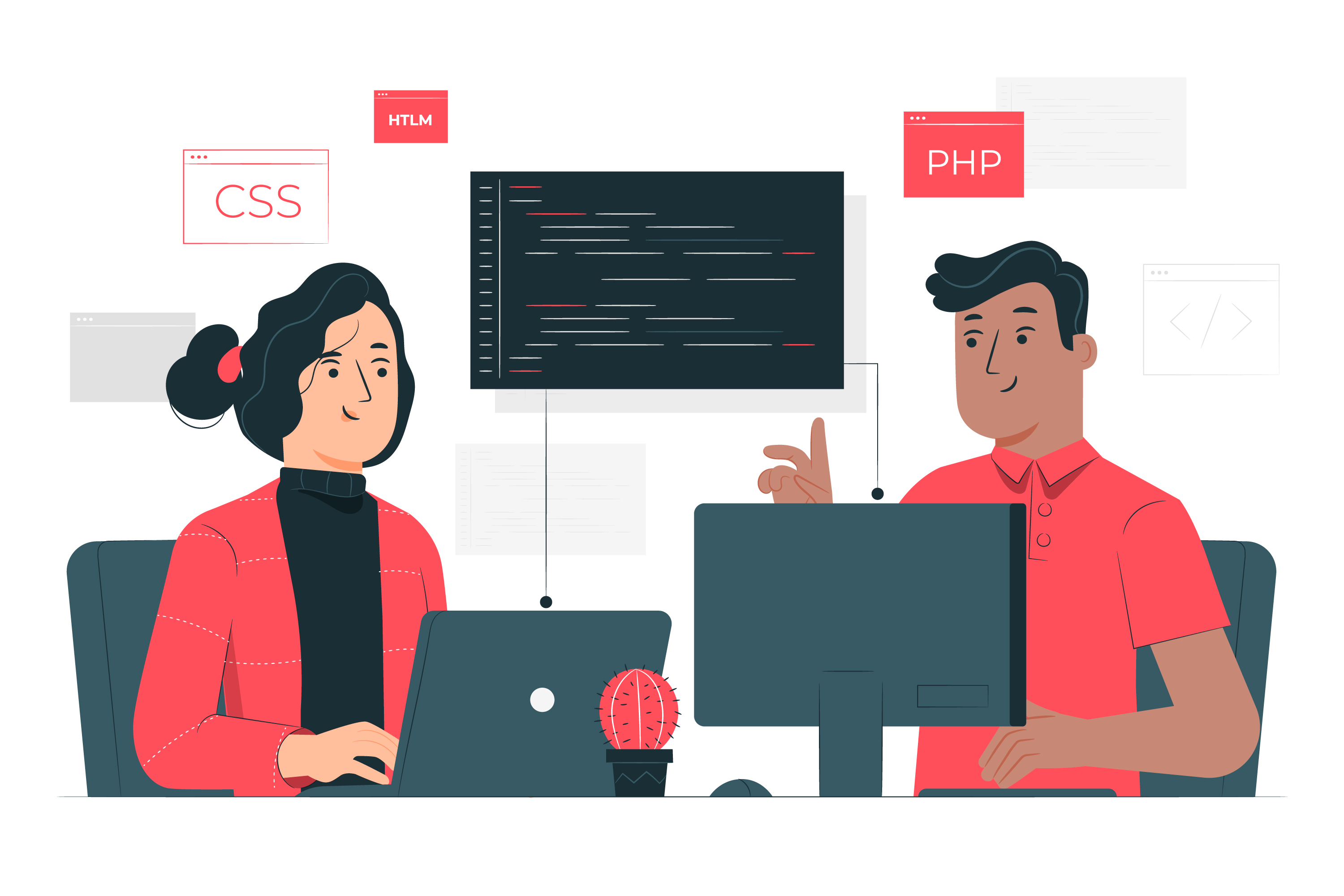Dedicated web developers are skilled professionals who work full-time on your project. They don’t juggle multiple clients. Instead, they focus only on your tasks, like building an app, fixing bugs, or adding new features. Think of them as part of your own team, just working from another place. You manage their work directly, choose what they focus on, and talk to them every day.
This setup helps you keep things simple and clear. It works well for startups, growing businesses, or anyone who needs regular support from dedicated programmers. You get the help you need without hiring full-time staff in your office. It’s flexible, reliable, and lets you move your project forward with less stress.

Why Hiring Dedicated Developers Can Make Your Life Easier
When your project starts growing, you’ll need more than just a few part-time freelancers. You’ll need full-stack development services and other programmers who stick with you, understand your goals, and build exactly what you need. That’s where dedicated software development teams come in. They’re not side-hustlers. They’re full-time experts focused only on your project. Here’s why hiring dedicated developers makes sense:
- You control the work. You decide what they do each day. No middlemen. No confusion.
- They know your product. Since they work with you long-term, they understand your idea inside out.
- You choose the right skills. Need a frontend expert? A backend wizard? Someone who knows both? You pick the stack and level.
- You move faster. With full focus on your work, progress comes quicker. No delays from juggling other clients.
- It saves time and energy. You don’t need to post jobs, run interviews, or hire full-time staff. A ready-to-go developer or team joins when you need them.
- It’s cost-effective. You pay for the work, not office space, benefits, or equipment.
This setup is perfect for startups, busy agencies, and companies that want to build or scale software without wasting time. You get your own dedicated developer team or team without adding to your in-house staff. You stay in control while they focus on results.

How to Find and Hire the Right Dedicated Programmers for Your Project
When your project needs dedicated development help, hiring dedicated programmers can save you time, money, and a lot of stress. These programmers work only for you, follow your instructions, and help you build your software just the way you want. But hiring them the right way takes more than just posting a job online. You need a clear plan.
Know What You Need
Before you start looking to hire dedicated software developers, you need to be sure about what kind of help you want. This means understanding your project, goals, and what type of skills you need. Ask yourself:
- What’s the goal of my project?
- Which tech stack will I use (JavaScript, Python, PHP, etc.)?
- Do I need a full team or just one programmer?
- Is this a short-term job or a long-term one?
The more clearly you answer these questions, the easier it will be to find the right fit. You’ll waste less time and avoid working with the wrong people.
Another thing to consider is the developer’s location. Before Slack became a huge success, the team behind it was working on a different product. As they pivoted toward creating a workplace chat tool, they needed to build quickly but didn’t have enough in-house developers. So, they hired remote programmers on contract—people who worked full-time on Slack, just not from their main office. These remote dedicated developers helped build early versions of the product and test core features. It gave the company a faster way to launch without hiring a full team from scratch.
Set Your Budget Before You Post the Job
Money always matters. Before posting job ads or talking to agencies, know how much you can spend. This doesn’t just mean per hour or per month. Think long-term. How many months do you plan to keep this person? Can you pay for full-time or part-time work? Also, think about where your developer will be from. Rates in Western Europe and North America are usually higher than in Asia or Eastern Europe(we mention this below). A clear budget helps you avoid back-and-forth later and lets the programmer know you’re serious.
Choose the Right Place to Hire From
Where you look makes a big difference in hiring a dedicated development team. If you post your job in the wrong place, you’ll get poor matches. There are several options. You can use freelance platforms like Upwork or Fiverr. You can also try developer job boards or coding communities like Stack Overflow or GitHub. Another option is to work with an agency that offers dedicated programmers. They already have trained staff and can match you with someone quickly. Think about how much control you want, how fast you need to hire, and how much help you need with the paperwork and contracts. Each platform has pros and cons depending on your goals.
Write a Job Description That Makes Sense
Now that you know what you need and where to look, it’s time to create a job post that stands out. A good job description helps you attract the right people and avoid the wrong ones. Include:
- What your project is about
- What you expect the programmer to do
- The tech stack or tools required
- How long the work will last
- What kind of work style you prefer (daily updates, working hours, etc)
Avoid writing long, confusing posts. Be clear and simple. Talk about your project in plain language. If your post is too vague, you’ll get low-quality applications.

Start Reviewing Candidates One by One
Once the applications roll in, you’ll need to go through them carefully. Don’t just scan resumes. Read dedicated programmers' messages and try to understand their mindset. Are they asking the right questions? Do they seem excited about your project?
Look at their past work, either through portfolio links or code samples. If possible, read reviews from other clients. You want someone who not only has the right skills but also knows how to work with clients, handle feedback, and meet deadlines. At this point, you should pick a few people for interviews, not just the cheapest or fastest ones.
Interview With Purpose, Not Just to Talk
The interview is your chance to learn how the person thinks. Skip the boring questions like “Where do you see yourself in five years?” and go straight to the work. Ask them how they would build a feature you’re planning. See if they can explain it in plain English. Ask how they handle bugs, missed deadlines, or unclear specs. You want someone who not only writes code but also solves problems. It’s also a good idea to give a test task. Keep it small—something that takes one or two hours—but related to your actual work. This shows you what they can really do under pressure.
Make a Clear Offer With All the Details
Once you’ve found someone who fits, don’t leave things open-ended. Send a clear offer that covers everything: the payment terms, working hours, job start date, communication tools, and how feedback will be given. If you’re working across time zones, set a daily overlap window where you can talk live. Put it all in writing. This avoids misunderstandings later. If you’re unsure about a long-term commitment, you can start with a two-week or one-month trial period. This gives both sides a chance to see if the collaboration feels right.
Prepare the Workspace Before the Start
When your programmer starts, don’t keep them waiting. Set up everything they’ll need—access to tools like Slack, Trello, GitHub, and any login credentials. Share your roadmap, current progress, and future goals. The first few days matter a lot. If you prepare well, the developer can start working from day one. Make them feel like part of the team. Check in daily during the first week, answer their questions, and make sure nothing is blocking them from doing their job.
Keep Track of Progress
Just hiring outsourcing developers isn’t enough. You need to keep an eye on how the work is going. Are deadlines being met? Are tasks done well? Is the developer working the hours they promised? Use tools like:
- Trello or Jira for task tracking
- Slack or Teams for messaging
- GitHub for code reviews
Build a Long-Term Relationship (If It Works)
The best results come when there’s trust on both sides. If the programmer feels respected, they’ll give you their best work. Don’t treat them like a short-term hire, even if they are. Say thank you when things go well. Be fair with your time and your payments. If they perform well, consider offering a raise or bonus. If your project is long-term, think about keeping them on for future tasks. A loyal programmer who knows your product is much more valuable than a new hire every few months.
Hiring a dedicated programmer isn’t just about finding someone with the right skills. It’s about finding someone who fits your way of working, your goals, and your pace.

How Much Does It Really Cost to Hire a Dedicated Web Developer?
Hiring a dedicated web developer can cost anywhere from $30 to $250 an hour, according to Quora. The price depends on where the developer is from, how skilled they are, and how complex your project is. Dedicated web developers in the U.S. or Western Europe charge more, often over $100 an hour. Those in places like India or Eastern Europe might charge between $30 and $70. On freelance platforms like Upwork, prices usually range from $10 to $100 per hour.
The more complex the job, the higher the rate. A senior developer will cost more than someone just starting out. But higher pay often means better results and fewer delays.
Many dedicated development companies offer monthly packages. You get a full-time developer at a fixed price. These deals often include extras like project updates and ongoing support. They’re usually cheaper than paying by the hour overtime.
So what’s the takeaway?
The cost of hiring a dedicated developer team depends on many things—where they live, how skilled they are, what your project needs, and how you want to pay. You could pay $30 an hour or $200, but both might be fair, depending on the job.
If you're looking to save money and still get good results, think about hiring through a company that offers full-time packages. It often ends up being more affordable and less stressful than hiring someone by the hour. Plus, you know upfront what you’re paying for—and that’s always a good thing.
